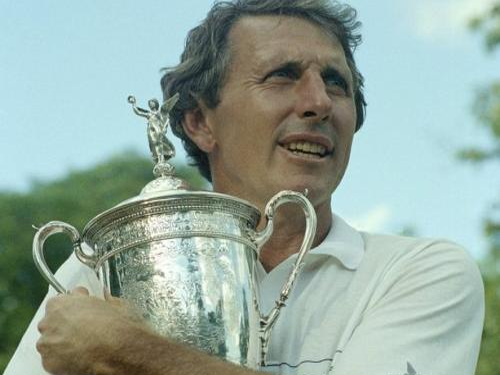Hale Irwin owns the distinction of being the first person to win a U.S. Open in a sudden-death playoff.
In the first of three U.S. Opens that ended up being decided in that manner — Ernie Els and Tiger Woods won the others — the former Boulder High School and University of Colorado athlete was tied for the top spot with Mike Donald not only at the end of regulation but after an 18-hole playoff in 1990. So a sudden-death format ensued.
But, to quote Bob Dylan, the times they are a changin’ — in this case regarding the U.S. Open playoff format. The USGA announced on Monday that all four USGA open championships — the U.S. Open, the U.S. Women’s Open, the U.S. Senior Open and the new U.S. Senior Women’s Open — will use a two-hole aggregate playoff should the leaders be tied after 72 holes. That means this year’s U.S. Senior Open at The Broadmoor in Colorado Springs could produce the first two-hole playoff in that championship’s history.
As for the U.S. Open, Irwin won his first two Open titles — in 1974 and ’79 — by two strokes each in regulation. But, as noted earlier, in 1990 at Medinah near Chicago, the now-World Golf Hall of Famer had to work overtime for his third U.S. Open victory.
After sinking a 45-foot birdie putt on the 72nd hole to shoot a final-round 67 and force a playoff, Irwin memorably took a lap around the green, high-fiving numerous fans along the way.
Then he squared off on Monday with Donald in an 18-hole playoff. But both matched 74s in the playoff, so it went to sudden death, and Irwin drained a birdie putt on the 91st hole of the championship to become the oldest winner of the U.S. Open, at 45. He holds that record to this day.
While that U.S. Open holds many indelible memories for Irwin, he sees this end of an era regarding 18-hole playoffs at the U.S. Open as simply a sign of the times.
“It’s not a surprise, frankly,” Irwin told Golf World on Monday. “I’m sure there have been a lot of opinions expressed to see a winner determined on Sunday, be it fans or media or Fox Sports, which is paying umpteen millions to broadcast the U.S. Open. I think tradition had to take a backseat here to the times we live in.”
The U.S. Open has utilized an 18-hole playoff — or briefly a 36-hole playoff, in the late 1920s and early ’30s — to break ties at the top at the end of regulation for its entire history. There have been 33 of those one- or two-round playoffs, starting in 1901 (Willie Anderson vs. Alex Smith) and ending in 2008 (Woods vs. Rocco Mediate, which also went to sudden death).
But, barring an unlikely changed of heart in the future, those are now a thing of the past.
“We know how important it is to everyone in the golf world to see play conclude on the Sunday of a major championship, and to award the trophy to the champion,” USGA executive director Mike Davis said in Monday’s announcement. “After receiving input from a variety of constituents, including players, fans, volunteers, officials and our broadcast partners, it clearly came across as something that everyone valued, and would benefit from.
“There is no right or wrong way to determine a winner in stroke play, but we’ve seen over the years how the aggregate playoff has served us well in both the U.S. Women’s Open and U.S. Senior Open. Two holes will allow a player to recover from any single mistake, and at the same time, provide a memorable, and perhaps dramatic, experience for all involved.”
As with the 18-hole playoff, if the competitors remain tied after the two extra holes, it would become a sudden-death affair.
Irwin, for one, would have preferred a longer playoff format than the one the USGA announced this week.
“I would have liked to see three- or four-hole playoffs,” said Irwin, who has also won two U.S. Senior Opens and was named the Colorado Male Player of the Century. “As a player, I would want as many holes as possible to determine a winner. That extra 18 holes was a grind, but it felt necessary.”
For whatever it’s worth, Irwin would have also beaten Donald in the new U.S. Open playoff format. They would have been tied after the two aggregate playoff holes, but Irwin would have prevailed on the fourth playoff hole as he made par there and Donald a bogey.
Irwin, who received a special exemption into the U.S. Open field in 1990, played in 34 consecutive U.S. Opens, second only to Jack Nicklaus’ 44.
As for the other men’s major championships, the Masters uses sudden death for playoffs, while the British Open utilizes a four-hole aggregrate and the PGA Championship a three-hole aggregate.
All of the four once used an 18-hole playoff format. The last 18-hole playoff in PGA Championship history was held in 1967 at Columbine Country Club, where Don January beat Don Massengale. The last at the Masters was in 1970, and the final one at the British Open was in 1975.


